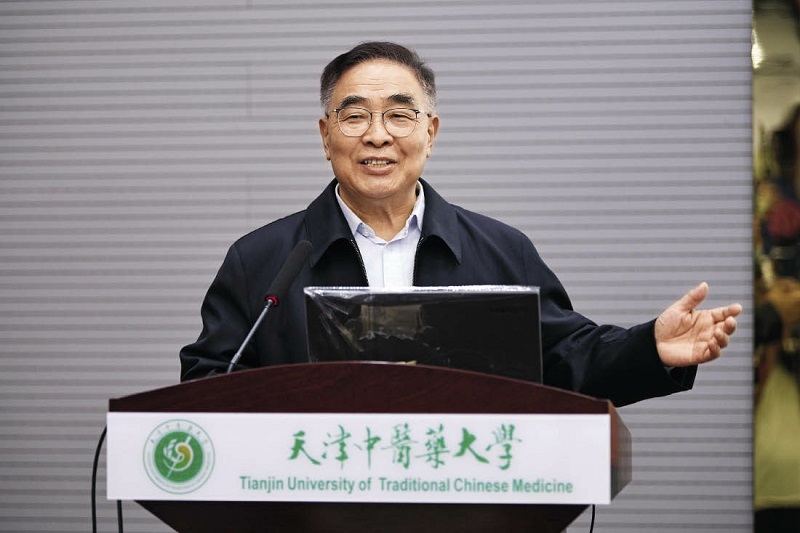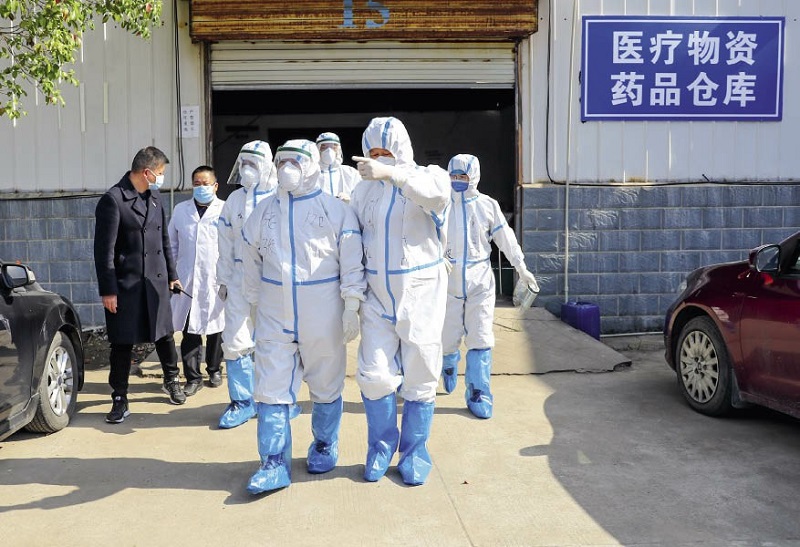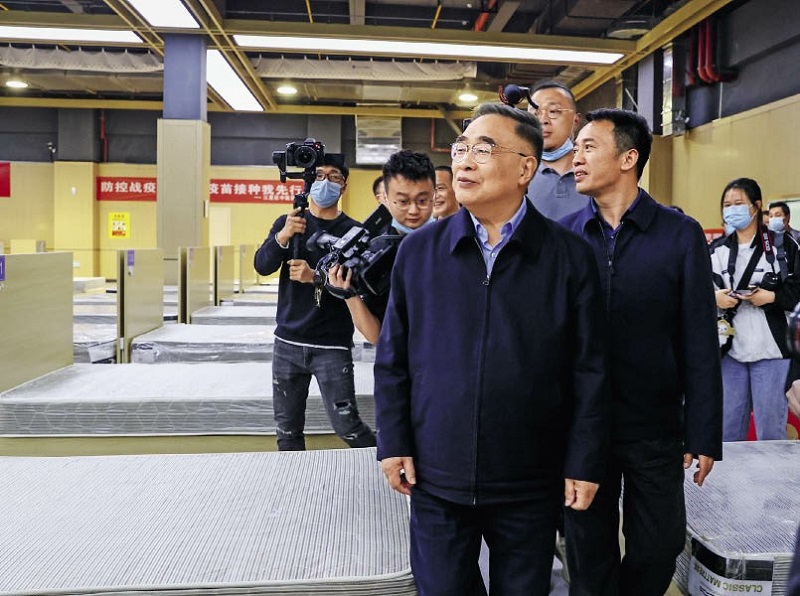In his capacity as practitioner of traditional Chinese medicine (TCM), Zhang Boli, 73, has made a long career out of saving lives. The most recent advocacy of Zhang’s chosen field of medicine was heard in the speech he made at an industry development conference on Chinese medicinal herbs produced in Zhejiang, held in the province’s Wuyi County. In his speech he said, “In developing TCM, we need to stick to its theoretical essences as well as absorb advanced technologies and methods from other disciplines.”
Proven Efficacy of TCM in Battling COVID-19
Zhang Boli’s skills as a TCM practitioner came to the fore in Wuhan in early 2020. When COVID-19 rendered the city the frontline of the battle against the virus, Zhang Boli’s life saving feats through TCM made him a household name there. He was among the first group of veteran medical experts to arrive at the then epicenter of the pandemic. After a brief but intensive study of the situation, Zhang suggested building a makeshift hospital exclusively for COVID-19 patients, whose treatment would mainly follow TCM protocols. The building, later named the Jiangxia Fangcang Makeshift Hospital was where on February 12, 2020, Zhang and the TCM team of more than 350 medical professionals he had brought together from provincial-level regions, including Tianjin, Jiangsu, Hunan, Shaanxi, and Henan, started treating COVID-19 patients.
Zhang and his 350-strong team of doctors and nurses cared of for patients, conducting procedures including tongue diagnosis, taking pulses, compiling prescriptions, touring wards, and convening conferences to devise treatment protocols. All this left him time with no more than two or three hours of sleep each day.
Owing to this overloaded daily routine the septuagenarian physician fell ill with cholecystitis, and on February 19 underwent a minimally invasive gall bladder removal. “Having bequeathed my gall bladder to Wuhan, I have a personal investment in the city and its people,” Zhang joked, as a way of expressing willingness to share Wuhan residents’ weal and woe.
Thanks to his efforts, TCM was used to treat the COVID-19 patients in Wuhan’s 16 makeshift hospitals, each with TCM experts on hand. TCM decoctions were part of the treatment of 90 percent of the 12,000 patients in these makeshift hospitals. As of March 10, when Wuhan’s makeshift hospitals closed, none of the 564 patients admitted to Jiangxia Fangcang Makeshift Hospital had deteriorated into a critical condition or been re-infected.
Born on February 26, 1948 in Tianjin, Zhang has many titles. They include TCM physician, academician of the Chinese Academy of Engineering, member of the Academic Advisory Committee of Chinese Academy of Medical Sciences, president of Tianjin University of Traditional Chinese Medicine, honorary president of China Academy of Chinese Medical Sciences, deputy technical chief of a national program on major new drug innovations, and inheritor of TCM decoction as state-level intangible cultural heritage.

Zhang Boli, president of Tianjin University of Traditional Chinese Medicine, is an academician of the Chinese Academy of Engineering and a member of the Academic Advisory Committee of Chinese Academy of Medical Sciences.
Lifelong Commitment to TCM
Zhang Boli has devoted his entire career to TCM and the study of Chinese medicinal herbs.
After graduating from a medical school in the 1960s, he worked at a rural medical center near the Bohai Sea in east China. Intrigued at how local veteran TCM doctors achieved satisfactory results from prescriptions compiled from common medicinal herbs, Zhang decided to explore the mysteries of TCM.
In those early days he would visit patients in villages, fishing boats, and on construction sites by bicycle, day and night, regardless of the weather. But he never allowed physical fatigue to compromise his dedicated TCM-based treatment of patients. It was indeed thanks to this relentless schedule that he accumulated extensive clinical experience that laid such solid foundations for his bright future in TCM.
In the 1980s, Zhang Boli directed his energies towards building a theory on tongue diagnosis based on observation. In the 1990s, he embarked on a systematic study of vascular dementia and came up with standard treatment protocols. After ascertaining the criteria for stroke syndrome and premonitory symptoms, he then built a comprehensive treatment protocol, the first putting forward pharmacological methods of cerebrospinal fluid analysis that reveal how TCM decoctions protect nerve cells. Since taking on studies of Chinese medicine formulas in 1999, he has developed the methodologies and key technologies for making modern TCM drugs based on component compatibility. At the turn of the millennium, he completed the first-ever large-scale evidence-based research on preventing coronary heart disease through TCM, and produced an evidence-based TCM evaluation system. He has since been committed to research on secondary development of Chinese patent medicines aimed at boosting development of the TCM pharmaceutical industry. As of June 2019, he had published more than 400 academic papers, 80 of which were included in the Science Citation Index, and compiled over 20 monographs.

Zhang Boli, together with other medical experts, surveys the Jiangxia Hospital of Traditional Chinese Medicine in Wuhan on March 18, 2020.
A Respected Physician
Zhang’s academic achievements, and consequently higher-ranking titles, have resulted in greater responsibilities, including being assigned important tasks, and busier schedules. Zhang, however, regards his fundamental role as that of a TCM practitioner whose mission is to treat patients on the frontline.
“Although always busy, he has never suspended an outpatient clinic. If emergencies arise, he asks the hospital to call the patients and make later appointments, and gives full medical consultation to all appointed patients no matter what,” the head nurse at the First Teaching Hospital of Tianjin University of Traditional Chinese Medicine Yu Jie said. “He is kind, gentle, and well-mannered. No matter how great the pressure, or how complicated the disease, he treats each patient with equal care and consideration.”
Zhang’s patients variously describe him as “a man of humor. He always uses simple, easy-to-understand examples to help us understand serious medical issues”; “very kind to us”; “a physician who cares for people, which makes him good company.”
A patient surnamed Wang who frequently comes to Zhang Boli for medical consultations said, “I come here not just because of his medical skills, but also because he shows me, by example, how to be a better person. Over the past five to six years, during which I’ve seen him, he has paid attention to both my mental and physical condition.”
Although in his 70s, Zhang still holds outpatient clinics three times a week. “Since the outpatient service resumed in May, he has never missed a single clinic,” Yu Jie said.
Yu recalled the day Zhang had to attend two meetings respectively in the morning and in the afternoon. “He skipped lunch to come and see the 30 patients who had appointments with him,” Yu said. “It was then that I realized the depth of his dedication to his patients and career.”

Zhang Boli revisits the Wuhan Jiangxia Makeshift Hospital on April 9, 2021.
Aiming for a Revival of TCM
Zhang holds that a good doctor makes accurate diagnoses, speaks well, thinks clearly, and excels in the lab. These are the criteria he sets for his TCM students.
Zhang also believes that, in addition to acquiring extensive and substantive TCM knowledge and a clinical way of thinking, a TCM physician should also study cross-disciplinary medical theories, including Western medicine, foster an international perspective, and be innovative and dexterous.
“We train TCM physicians to tend to people’s health throughout their lives,” he said. Zhang believes training as a TCM physician you not only benefit from attending medical school, but learn a lot from experienced mentors.
TCM is a scientific gem that the Chinese people have refined throughout its time-honored history. It is also the key to the treasure trove of Chinese civilization. Many of its basic theories concur with the development trend of modern medicine.
Inspired by the Eastern Jin Dynasty (317-420) TCM classic, Handbook of Prescriptions for Emergencies, Tu Youyou, together with her team, applied ancient Chinese therapies to their devising of an effective anti-malaria drug that saved millions of lives throughout developing countries. Tu won the 2015 Nobel Prize in medicine for her discovery of artemisinin.
Having always cherished the hope of popularizing TCM throughout the world, Zhang has thought deeply about this quest. Efficacy is what matters most, Zhang believes. Although evidence of it exists, more detailed research should be carried out. Cultural differences between China and Western countries are another hurdle. In Zhang’s view, it is also very important to improve the quality of TCM medicinal products and strengthen intra-governmental cooperation to create an enabling environment for trade in TCM services and products.
Zhang’s contribution to TCM, the people, and the country is universally acknowledged in China. On August 11, 2020, Chinese President Xi Jinping conferred on Zhang Boli the national honorary title of the “People’s Hero.” To Zhang, the title adds one more spur to his dedication to TCM.